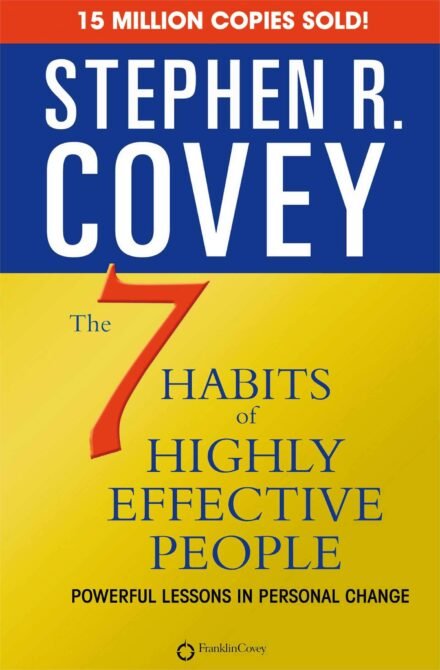The 7 Habits of Highly Effective People: A Practical Guide for Success
Do you want to be more successful in your personal and professional life? Do you want to achieve your goals and live a fulfilling and meaningful life? If you answered yes, then you need to learn and apply the 7 habits of highly effective people.
The 7 habits of highly effective people is a book by Stephen R. Covey that has sold over 25 million copies worldwide. It is based on the principle that true success is not a matter of luck or talent, but a result of aligning yourself with universal and timeless principles of character and integrity.
In this blog post, I will give you a brief summary of each habit and how you can put them into practice in your daily life. By following these habits, you will be able to improve your productivity, relationships, and happiness.
Habit 1: Be Proactive
The first habit is to be proactive, which means taking responsibility for your life and actions. You are not a victim of your circumstances, but a creator of your destiny. You have the power to choose how you respond to any situation, instead of reacting based on your emotions or impulses.
To be proactive, you need to focus on what you can control, which is your circle of influence. This includes your attitude, behavior, decisions, and actions. You need to avoid wasting time and energy on things that you cannot control, which is your circle of concern. This includes other people’s opinions, the weather, the economy, etc.
To practice this habit, you need to:
– Identify the things that are within your circle of influence and the things that are within your circle of concern.
– Make a plan to act on the things that are within your circle of influence and let go of the things that are within your circle of concern.
– Use proactive language, such as “I can”, “I will”, “I choose”, instead of reactive language, such as “I can’t”, “I have to”, “I should”.
– Anticipate problems and opportunities and prepare for them in advance.

Habit 2: Begin With the End in Mind
The second habit is to begin with the end in mind, which means having a clear vision of what you want to achieve in life. You need to define your purpose, values, goals, and mission statement. This will help you to stay focused and motivated on what matters most to you.
To begin with the end in mind, you need to:
– Imagine yourself at the end of your life and reflect on what you want to be remembered for.
– Write down your personal mission statement, which is a summary of your purpose, values, goals, and roles in life.
– Review your mission statement regularly and use it as a guide for making decisions and setting priorities.
– Align your actions with your mission statement and measure your progress towards your goals.
Habit 3: Put First Things First
The third habit is to put first things first, which means managing your time and energy effectively. You need to prioritize your tasks based on their importance and urgency. You need to focus on the things that are important but not urgent, which are the activities that contribute to your long-term goals and mission. These are also known as Quadrant II activities.
To put first things first, you need to:
– Identify your “Quadrant II” activities, which are the things that are important but not urgent. These include planning, learning, building relationships, exercising, etc.
– Schedule time for your Quadrant II activities and protect it from interruptions and distractions.
– Delegate or eliminate your Quadrant III and IV activities, which are the things that are not important but urgent or not important and not urgent. These include interruptions, busywork, trivia, etc.
– Say no to the things that are not aligned with your goals and values.
Habit 4: Think Win-Win
The fourth habit is to think win-win, which means seeking mutual benefit in all your interactions with others. You need to have an abundance mentality, which is the belief that there is enough for everyone. You need to respect yourself and others and seek solutions that satisfy both parties.
To think win-win, you need to:
– Understand the needs and interests of both parties involved in a situation.
– Communicate openly and honestly with others and listen empathically to their point of view.
– Seek creative alternatives that can satisfy both parties without compromising their values or principles.
– Celebrate the success of others and share credit and recognition.
Habit 5: Seek First to Understand, Then to Be Understood
The fifth habit is to seek first to understand, then to be understood, which means listening actively and attentively before speaking or giving advice. You need to empathize with others and try to see things from their perspective. You need to avoid making assumptions or judgments based on your own biases or filters.
To seek first to understand, then to be understood, you need to:
– Use the four levels of listening: mimic, rephrase, reflect, and empathize. Mimic means repeating what the other person said. Rephrase means saying what the other person said in your own words. Reflect means expressing the feelings behind the words. Empathize means putting yourself in the other person’s shoes and feeling what they feel.
– Ask open-ended questions to clarify and explore the other person’s thoughts and feelings.
– Acknowledge and validate the other person’s point of view and emotions, even if you disagree with them.
– Express your own thoughts and feelings after you have understood the other person’s.

Habit 6: Synergize
The sixth habit is to synergize, which means working together with others to achieve more than you could alone. You need to value diversity and appreciate the differences in people’s strengths, styles, and perspectives. You need to seek the third alternative, which is a solution that is better than what either party originally proposed.
To synergize, you need to:
– Identify a common goal or purpose that unites you and others.
– Build trust and rapport with others by being open, respectful, and supportive.
– Share your ideas and opinions and invite feedback from others.
– Listen to and learn from others’ ideas and opinions and build on them.
– Seek win-win solutions that benefit all parties involved.
Habit 7: Sharpen the Saw
The seventh habit is to sharpen the saw, which means renewing yourself regularly in four dimensions: physical, mental, emotional, and spiritual. You need to take care of yourself and balance your life in order to maintain your effectiveness and well-being.
To sharpen the saw, you need to:
– Engage in physical activities that improve your health, energy, and endurance, such as exercising, eating well, sleeping well, etc.
– Engage in mental activities that stimulate your mind and expand your knowledge, such as reading, learning, writing, etc.
– Engage in emotional activities that enhance your relationships and happiness, such as socializing, expressing gratitude, serving others, etc.
– Engage in spiritual activities that connect you with your inner self and higher power, such as meditating, praying, reflecting, etc.
These are the 7 habits of highly effective people that can help you achieve success in your personal and professional life. By practicing these habits consistently, you will be able to improve your productivity, relationships, and happiness. I hope you enjoyed this blog post and found it useful. If you want to learn more about these habits and how to apply them in your life, I recommend you read the book by Stephen R. Covey, it is really helpful.
Thank you for reading, and stay tuned for more posts on personal development! 😊
Written by Mirna

